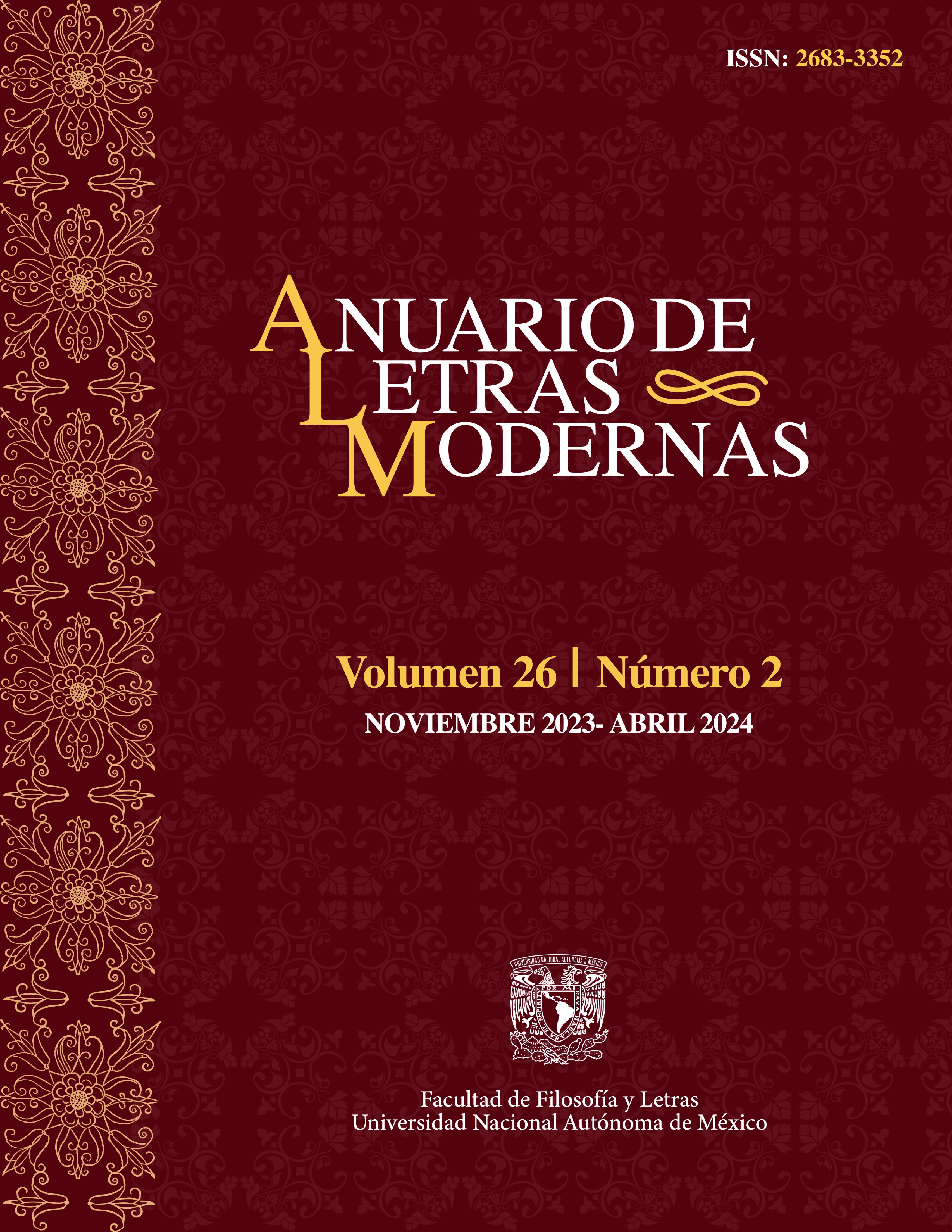Between the Sonnet and the Dramatic Monologue: Borges and His Search for the Poem
Main Article Content
Abstract
This paper considers the way in which Jorge Luis Borges approached the notion and explored the possibility of writing the “absolute poem”, i.e., a composition akin to the great classical epics, or to the attempts since Romanticism to write a text of similar stature. In the first part of this text, I offer evidence that this aspiration is present in Borges’s work since the very beginning of his career. The first technical model for such an enterprise was that of Whitman, who made use of long enumerations that tried to encompass the vastness of human experience. Borges, nevertheless, soon grew dissatisfied with such a technique and started to explore other venues. In the central part of this paper I suggest that, in some of his short stories—“El Aleph”, “La escritura del dios”, and “Undr”—he is of the opinion that such a composition should be rich in allusions rather than enumerative, and compact rather than vast, since what is transcendental does not need to be excessive. In the final part of this paper, I offer a commentary of “Él”, one of his late poems. I consider that it is one of several attempts on the part of Borges to explore the possibility of creating the aforementioned text. In it, he combines his own variations of the Shakespearean sonnet and of the English dramatic monologue in a highly allusive and intertextual composition.
Article Details

This work is licensed under a Creative Commons Attribution-NonCommercial-NoDerivatives 4.0 International License.
References
Alazraki, Jaime. (1986). “Enumerations as Evocations: On the Use of a Device in Borges’ Latest Poetry”. En Carlos Cortínez (Ed.), Borges the Poet (pp. 149-157). The University of Arkansas Press.
Alazraki, Jaime. (1988). “Outside and inside The Mirror in Borges’ Poetry”. En Borges and The Kabbalah and Other Essays on His Fiction and Poetry (pp. 107-115). G. K. Hall.
Borges, Jorge Luis. (1923). “A quien leyere”. En Fervor de Buenos Aires (s.p.). Serrantes.
Borges, Jorge Luis. (1974a [1945]). “El Aleph”. En Obras completas 1923-1972 (pp. 617-628). Emecé.
Borges, Jorge Luis. (1974b [1965]). “Él”. En Obras completas 1923-1972 (p. 898). Emecé.
Borges, Jorge Luis. (1974c [1949]). “La escritura del dios”. En Obras completas 1923-1972 (pp. 596-599). Emecé.
Borges, Jorge Luis. (1974d [1953]). “Mateo, XXV, 30”. En Obras completas 1923-1972 (p. 874). Emecé.
Borges, Jorge Luis. (1974e [1947]). “Nota sobre Walt Whitman”. En Obras completas 1923-1972 (pp. 249-253). Emecé.
Borges, Jorge Luis. (1974f [1944]). “Prólogo”. [Prólogo a El jardín de senderos que se bifurcan]. En Obras completas 1923-1972 (p. 429). Emecé.
Borges, Jorge Luis. (1974g [1972]). “Prólogo” [Prólogo a El oro de los tigres]. En Obras completas 1923-1972 (p. 1081). Emecé.
Borges, Jorge Luis. (1989a [1975]). “Epílogo” [Epílogo a El libro de arena]. En Obras completas 1975-1985 (p. 72-73). Emecé.
Borges, Jorge Luis. (1989b [1981]). “Unas notas” [Notas a La cifra]. En Obras completas 1975-1985 (p. 340). Emecé.
Borges, Jorge Luis. (1989c [1977]). “Epílogo” [Epílogo a Historia de la noche]. En Obras completas 1975-1985 (p. 202). Emecé.
Borges, Jorge Luis. (1989d [1975]). “Undr”. En Obras completas 1975-1985 (pp. 48-51). Emecé.
Borges, Jorge Luis. (1997 [1922]). “Forjadura”. En Textos recobrados 1919-1929. (p. 161). Emecé.
Borges, Jorge Luis; Jurado, Alicia. (1991 [1976]). Qué es el budismo. En Obras completas en colaboración. (pp. 719-781). Emecé.
Browning, Robert. (1996). “Caliban upon Setebos, or Natural Theology in The Island”. En John Pettigrew (Ed.), Robert Browning: The Poems, Vol. 1 (pp. 805-812). Penguin Books.
Cervera Salinas, Vicente. (2011). “El universo sensitivo del verbo poético: Borges y el ‘olor de la carpintería’”. Cartaphilus, (9), 98-110. https://revistas.um.es/cartaphilus/article/view/142521/127831.
Costa Picazo, Rolando. (2010). “Notas a ‘Él’”. En Jorge Luis Borges, Obras completas: edición crítica, Vol. 2 (Rolando Costa Picazo, Ed.) (pp. 546-548). Emecé.
Culler, Jonathan. (2015). Theory of the Lyric. Harvard University Press.
Emerson, Ralph Waldo. (2001). “Brahma”. En Joel Porte y Saundra Morris (Eds.), Emerson’s Prose and Poetry (pp. 464-465). Norton.
Ferrater Mora, José. (2009). Diccionario de Filosofía. Ariel.
González Echeverría, Arturo. (2013). “The Aleph”. En Edwin Williamson (Ed.), The Cambridge Companion to Jorge Luis Borges (pp. 123-136). Cambridge University Press.
Helft, Nicolás. (1997). Jorge Luis Borges: bibliografía completa. Fondo de Cultura Económica.
Klonsky, Milton. (1977). William Blake. The Seer and His Visions. Harmony Books.
Kristal, Efraín. (2013). “The Book of Sand and Shakespeare’s Memory”. En Edwin Williamson (Ed.), The Cambridge Companion to Jorge Luis Borges (pp. 160-171). Cambridge University Press.
Olea Franco, Rafael. (2013). “The Early Poetry (1923-1929)”. En Edwin Williamson (Ed.), The Cambridge Companion to Jorge Luis Borges (pp. 172-185). Cambridge University Press.
Onions, Charles Talbot. (1966). The Oxford Dictionary of English Etimology. Oxford.
Shakespeare, William. (1999). The Tempest (Virgina Mason Vaughan y Aldent T. Vaughan, Eds.). The Arden Shakespeare.
Tomassini, Graciela. (2017). “Borges: la opción por la brevedad”. En José Luis Moure (Ed.), Borges esencial (pp. cxix-cxx). Real Academia Española; Asociación de Academias de la Lengua Española.
Upanishads. (2002). Signet Classics.
Wilson, Jason. (2013). “The Late Poetry (1960-1985)”. En Edwin Williamson (Ed.), The Cambridge Companion to Jorge Luis Borges (pp. 186-200). Cambridge University Press.

